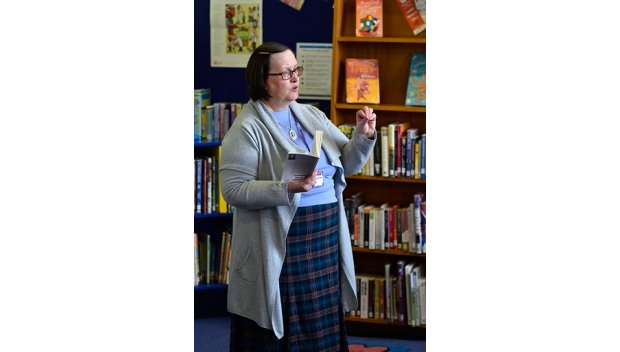In the current climate, with the pressure on teachers and schools from data-driven inspections and comparison tables, and the failure of Mr Gove to understand the importance of play in learning, here are some ideas for both teachers and for parents. As a former teacher, and someone who has pondered long and hard about why children love poetry when they start secondary school but grow up to find it difficult and inaccessible, in too many cases, I feel qualified to speak out about how this situation can be remedied. Now I work a good deal as a poet-in-schools, and see much good practice, but have met many teachers who lack confidence when teaching poetry.
With younger children, starting from birth, read them lots and lots of poems for pleasure – ones you like yourself. Even babies enjoy rhythm and rhyme, and the sound of a loved one’s voice. Use actions such as bouncing on the knee, and you already have them hooked.
Once children begin to have some skill with language, play word games such as pun jokes, the minster’s cat, word association, and even invent your own. Take your children to the local library and encourage them to take out a poetry book as well as a story book. Poems are great for reading aloud.
In primary school, include poetry as well as stories in Story Time, and use reading a poem as a way of settling a class, or rounding off the day. Many prayers are poems. Poetry is wonderful for those struggling to master the art of reading, as the hit of a complete text in a minute of reading reward the reader, and poems including repetition build confidence. Display good poem posters in the classroom and change them often. This also applies in secondary school. Use adverts and other similar texts for teaching about literary devices, not poetry. Do try and bring in some poets. The impact of meeting a real live poet, and working with them for a day, can have a profound effect on children. While it is true that this involves costs, at a time when money is tight, it is well worth doing, and looking around for schemes which make the day more affordable can really pay off. Able Writers and Reluctant Writers, run by Authors Abroad, is one such, in which the host school goes free, and the author’s fee comes from pupils from other schools.
In secondary school, pupils arrive with some love of poetry, though they often have a fixation on rhyme. But this changes as they go through the school, and I am convinced it is because they have to start writing essays on poetry, and very often, the only time they see a poem in class, they know an assignment is coming. No-one really enjoys writing those: a forensic examination of the poem can surgically remove its beating heart.
But there are other ways to demonstrate understanding of this genre, which can be applied to other literature as well. Here I offer some of the ones that have worked for me. Invite creative responses, rather than feature-spotting and comprehension. Creative responses could include a poster, illustrating a favourite line, a short film, a drama, a dramatic reading, a poem, a letter to the poet, a dance routine, a piece of art or music. Use poetry as a treat. But treat often. A great homework is to find a poem they like and type it or write it out, with illustrations if they wish, along with a paragraph on why they like it. These can be put into a ring binder to create a class anthology, and added to over the years. Have a wide range of good and exciting-looking poetry anthologies and collections available for children to use, borrow, or read when they have completed their work.
Hold poetry reading sessions in class or at lunchtime, where their own or favourite poems can be shared and confidence developed. Avoid separating language devices from meaning. Allow children to come to their own understanding of a poem, provided they can offer evidence from the text. Discourage the idea that poems have ‘hidden meanings’ or are trying to trick the reader. Other meanings will reveal themselves once the surface is believed and has become familiar. When writing a poetry essay is unavoidable, read the poem a few times to the pupils, then ask them to tell you which phrases etc they remember from hearing it, then write these on the board and discuss why. This allows children to show their understanding independently.
Experiment with your own ideas for working with poetry, and look beyond the usual. Don’t assume that some poems may be too difficult for the individuals. I found a low set at a comprehensive school I first taught at really loved the Fred D’Aguiar poems I did with them, which were written in Black English. I once in my ‘ignorance’ did Sylvia Plath and Philip Larkin poems with a GCSE class, appalling the head of department who said those were ‘A Level texts’. The pupils surprised him by writing excellent essays, and this was a class who’d told me I had to ‘translate poems line by line ‘ to them because they couldn’t understand it. I didn’t do that, of course. I used the methods I have outlined above.
